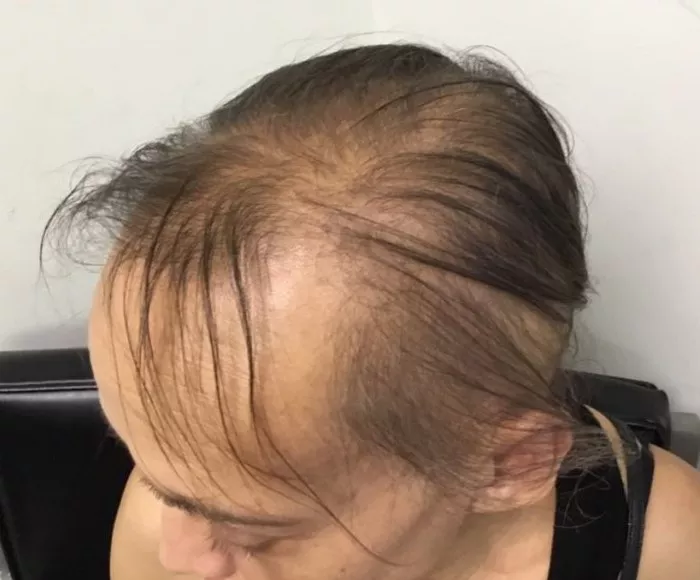Hair loss is a concern that can be attributed to various factors, and medications are one of the potential culprits. Certain drugs, intended for various health conditions, may have the unintended side effect of causing hair loss. In this article, we will explore the relationship between medications and hair loss, shedding light on some commonly prescribed drugs that may lead to this unwelcome side effect.
Understanding Drug-Induced Hair Loss
Medications can affect the hair growth cycle by disrupting the normal phases of growth and rest. The most common form of drug-induced hair loss is telogen effluvium, a condition characterized by excessive shedding of hair during the resting (telogen) phase of the hair cycle. In some cases, medications may also cause anagen effluvium, which impacts the actively growing phase of hair follicles.
See Also: Causes of Hair Loss 4 Months Postpartum: What You Need to Know
Anticoagulants: Blood Thinners
One category of medications associated with hair loss includes anticoagulants, commonly known as blood thinners. Warfarin and heparin are examples of anticoagulants that may lead to hair loss as a side effect. While the exact mechanism is not fully understood, it is believed that these medications may disrupt the hair growth cycle, resulting in increased shedding. It’s crucial for individuals prescribed blood thinners to be aware of this potential side effect and discuss any concerns with their healthcare provider.
Antidepressants: Managing Mental Health
Certain antidepressant medications have been linked to hair loss as well. Selective serotonin reuptake inhibitors (SSRIs), a widely prescribed class of antidepressants, are known to be associated with hair thinning. Fluoxetine (Prozac), sertraline (Zoloft), and paroxetine (Paxil) are examples of SSRIs that may contribute to hair loss. Individuals experiencing this side effect should communicate openly with their mental health provider to explore alternative medications or additional interventions.
Acne Medications: Isotretinoin
Isotretinoin, a powerful medication used to treat severe acne, is known to cause hair loss in some individuals. While the primary focus of isotretinoin is on reducing acne by affecting sebum production and skin cell turnover, hair loss can be an unintended consequence. Monitoring for this side effect and discussing concerns with a dermatologist is essential for those undergoing isotretinoin treatment.
Antibiotics: A Double-Edged Sword
Certain antibiotics, particularly those in the fluoroquinolone class, have been associated with hair loss. Ciprofloxacin and levofloxacin are examples of fluoroquinolone antibiotics that may cause this side effect. It’s important to note that not all antibiotics contribute to hair loss, and the relationship between antibiotics and hair health is complex. Individuals prescribed antibiotics should be vigilant about any changes in hair density and seek advice from their healthcare provider if concerns arise.
Immunosuppressants: Balancing Risks and Benefits
Immunosuppressant medications, prescribed to suppress the immune system in conditions such as organ transplantation or autoimmune diseases, can also impact hair health. Medications like methotrexate and cyclosporine have been linked to hair loss in some cases. While the benefits of immunosuppressants in managing serious health conditions often outweigh the risks, individuals should communicate openly with their healthcare team about any concerns related to hair loss.
Anticonvulsants: Managing Seizures
For individuals managing seizures with anticonvulsant medications, hair loss can be a potential side effect. Valproic acid, phenytoin, and carbamazepine are examples of anticonvulsants that may contribute to hair thinning or shedding. Balancing the management of seizures with potential side effects requires ongoing communication with a neurologist or healthcare provider.
Hormonal Medications: A Complex Interplay
Hormonal medications, including certain contraceptives and hormone replacement therapies, can influence hair growth patterns. While some individuals may experience hair thinning or shedding as a result of hormonal fluctuations, others may find that these medications have a positive impact on their hair. It is essential to discuss any concerns about hair loss with a healthcare provider, particularly when considering or using hormonal medications.
Chemotherapy: An Unavoidable Side Effect
Perhaps one of the most widely recognized causes of drug-induced hair loss is chemotherapy. Cancer-fighting drugs target rapidly dividing cells, including those responsible for hair growth. The result is often widespread hair loss, impacting not only the scalp but also other body hair. While hair loss during chemotherapy is usually temporary, it can be emotionally challenging. Support from healthcare providers and resources such as wig banks and counseling services can be invaluable during this period.
Taking Action and Seeking Support
If individuals notice hair loss while taking medications, it is crucial to address concerns promptly. Open communication with healthcare providers allows for a thorough evaluation of potential causes and consideration of alternative medications if necessary. In some cases, adjusting the dosage or combining medications may help minimize hair loss.
Additionally, seeking support from dermatologists, mental health professionals, or other specialists can provide valuable insights into managing the emotional and psychological aspects of drug-induced hair loss. Understanding the potential side effects of medications, along with proactive communication with healthcare providers, empowers individuals to make informed decisions about their treatment plans while addressing the impact on their hair health.
Conclusion
In conclusion, understanding the potential impact of medications on hair health is vital for individuals navigating drug-induced hair loss. While some side effects are unavoidable, open communication with healthcare providers empowers patients to make informed decisions about their treatment plans. Monitoring changes in hair density and seeking timely support can mitigate the emotional and psychological impact of hair loss. By striking a balance between managing health conditions and addressing the side effects of medications, individuals can navigate the challenges of drug-induced hair loss with resilience and confidence.


